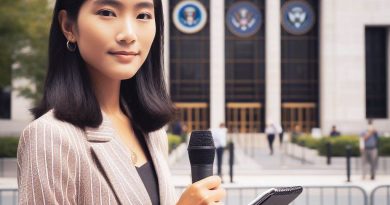Legal Aspects of Journalism: First Amendment Rights and Beyond
Last Updated on January 27, 2024
Introduction
Legal aspects play a vital role in journalism, ensuring the protection of rights and responsibilities.
These aspects govern the actions of journalists and media organizations.
The importance of legal aspects in journalism
Legal aspects in journalism provide a framework that protects both journalists and the public.
They help maintain credibility, accuracy, and ethical standards within the field.
These aspects establish boundaries and facilitate fair reporting.
Overview of the First Amendment rights and its significance in journalism
The First Amendment of the United States Constitution guarantees freedom of speech, expression, and the press.
In journalism, this amendment allows journalists to report without government intervention, promoting a free and independent press.
The First Amendment safeguards the public’s right to receive information and ideas from a variety of sources.
It prevents censorship, encourages public debate, and holds those in power accountable.
Journalists use this right to investigate and report on issues affecting society, facilitating an informed citizenry.
However, the First Amendment does have limitations to protect national security, public safety, and individuals’ privacy.
Journalists must navigate these boundaries responsibly, without infringing on the rights of others.
In addition to the First Amendment, other legal aspects such as defamation, privacy, intellectual property, and access to information are also crucial in journalism.
Understanding these laws ensures journalists stay within legal boundaries while fulfilling their role as a watchdog for society.
Overall, legal aspects are essential in journalism as they uphold journalistic integrity, protect freedom of the press, and enable the public to access accurate and diverse information.
Journalists must be aware of these legal boundaries to maintain their credibility and serve the public interest.
First Amendment Rights
The First Amendment is a crucial aspect of journalism, as it protects the fundamental freedom of speech and press.
It ensures that journalists can report on important issues without fear of censorship or punishment.
First Amendment and its protection of freedom of speech and press
The First Amendment of the United States Constitution states that “Congress shall make no law… abridging the freedom of speech, or of the press.”
This means that the government cannot restrict or regulate what journalists can say or publish.
Freedom of speech and press are essential for a functioning democracy, as they allow citizens to access information, discuss ideas, and hold those in power accountable.
Journalists play a vital role in upholding these rights by providing accurate and unbiased news to the public.
How journalists exercise their First Amendment rights
Journalists exercise their First Amendment rights by actively investigating and reporting on matters of public interest.
They have the freedom to express their opinions, critique government policies, and expose corruption or wrongdoing.
Additionally, journalists have the right to protect their sources.
Confidentiality is crucial for obtaining information and whistleblowers may be more willing to come forward if they can remain anonymous.
This protection is vital for investigative journalism and ensuring transparency.
Examples of landmark cases related to First Amendment rights in journalism
- New York Times Co. v. United States (1971): This case involved the publication of the Pentagon Papers, classified documents about the Vietnam War.
The Supreme Court ruled in favor of the newspaper, stating that the government could not prevent the publication. - Hustler Magazine v. Falwell (1988): In this case, the Supreme Court held that a parody advertisement in Hustler Magazine, mocking Reverend Jerry Falwell, was protected under the First Amendment.
The court ruled in favor of the magazine, emphasizing the importance of free speech. - Tinker v. Des Moines Independent Community School District (1969): This case involved students who wore black armbands to protest the Vietnam War.
The Supreme Court ruled that students do not “shed their constitutional rights to freedom of speech or expression at the schoolhouse gate.”
These landmark cases establish important precedents for the protection of First Amendment rights in journalism.
They demonstrate the courts’ commitment to upholding the freedom of speech and press, even when controversial topics are involved.
In general, the First Amendment rights are essential for journalism to thrive in a democratic society.
They allow journalists to report freely and provide accurate information to the public.
Understanding the First Amendment and its protection is crucial for both journalists and the general public to ensure the integrity and transparency of the news media.
Read: Job Market Overview: Technical Writer Opportunities in the USA
Privacy and Defamation Laws
Privacy laws play a critical role in the field of journalism, especially when it comes to balancing an individual’s right to privacy with the public’s right to know.
These laws intersect with journalism in various ways and have a significant impact on how news is reported and shared.
Examination of privacy laws and their intersection with journalism
Privacy laws are designed to protect an individual’s personal information, including their name, address, and other private details.
However, the extent to which these laws apply to journalists is not always clear-cut.
When reporting on matters of public interest, journalists often find themselves caught between the public’s right to be informed and an individual’s right to privacy.
While the First Amendment of the United States Constitution guarantees freedom of the press, it does not grant journalists absolute immunity from privacy laws.
Journalists must navigate a complex legal landscape to strike a balance between the two conflicting rights.
In cases where the public interest outweighs an individual’s right to privacy, journalists may have more leeway in reporting certain personal details.
The balance between public interest and an individual’s right to privacy
Determining the appropriate balance between public interest and an individual’s right to privacy can be challenging.
Courts often weigh various factors, such as the newsworthiness of the information and the impact of its publication on the person’s private life.
However, the line between what is considered in the public interest and what is a mere invasion of privacy can be blurry.
Establishing guidelines or criteria that can help journalists make informed decisions is crucial to avoid unnecessary legal repercussions.
Moreover, the rise of digital journalism and social media platforms has further complicated the privacy landscape.
Journalists must now grapple with the ethical implications of collecting and disseminating personal information that is easily accessible online.
Defamation laws and their impact on journalism
Defamation laws aim to protect an individual’s reputation from false statements that harm their character or integrity.
This area of law significantly impacts journalism as it relates to journalistic integrity and the responsibility of journalists to report accurate information.
Journalists must exercise caution when reporting contentious or potentially damaging stories.
Publishing false information, even unintentionally, can result in costly defamation lawsuits.
Defamation laws require journalists to adhere to rigorous standards of accuracy and truthfulness in their reporting.
Journalists should verify facts, cite reliable sources, and ensure a fair representation of all perspectives involved.
Examples of high-profile defamation cases in journalism
Over the years, several high-profile defamation cases have captured public attention and highlighted the legal challenges faced by journalists.
One notable example is the case between Hulk Hogan and Gawker Media, where Hulk Hogan sued Gawker for publishing a sex tape featuring him without his consent.
The case resulted in a substantial monetary award in favor of Hulk Hogan, leading to the bankruptcy of Gawker Media.
Another landmark case involves the Washington Post and Richard Jewell.
The newspaper implied Jewell’s involvement in the 1996 Olympic Park bombing, later retracting the statement.
Richard Jewell filed a defamation lawsuit against the newspaper, ultimately leading to a settlement.
These cases emphasize the importance of responsible journalism and the potential legal consequences of crossing the line between factual reporting and harmful defamation.
Basically, privacy and defamation laws greatly influence the practice of journalism.
As journalists strive to inform the public, they must carefully navigate the legal boundaries of privacy rights and ensure that the information they report is accurate and fair to avoid reputational and monetary damages resulting from defamation lawsuits.
Read: Understanding the Different Niches in Technical Writing
Confidentiality and Protection of Sources
Confidentiality of sources is a crucial aspect of journalism, ensuring the free flow of information.
It allows journalists to gather and report news without fear of repercussions.
Importance of the Confidentiality of Sources in Journalism
- Protects whistleblowers: Confidentiality encourages individuals to come forward with evidence of wrongdoing.
- Promotes investigative journalism: Sources feel safe sharing sensitive information, leading to in-depth reports.
- Fosters trust: Maintaining source confidentiality builds trust between journalists and their sources.
Shield Laws and How They Protect Journalists
Shield laws are legal protections that safeguard journalists from being forced to identify their confidential sources in court.
- Varies by jurisdiction: Shield laws differ in scope and applicability across countries and states.
- Journalist’s privilege: Shield laws recognize the journalist’s right to protect their sources.
- Exceptions exist: Some jurisdictions have exceptions when national security or public interest is at stake.
Ethical Dilemmas Surrounding the Protection of Sources
While source protection is critical, ethical dilemmas can arise in certain situations.
Journalists must weigh conflicting interests carefully.
- Potential harm: Protecting a source may result in harm to innocent individuals or obstruct justice.
- Truth and accountability: Balancing source confidentiality with the need for transparency can be challenging.
- Journalistic integrity: Some argue that revealing sources compromises journalistic independence and credibility.
Examples of Cases Involving Source Confidentiality and Their Legal Implications
Several cases have raised significant legal questions and highlighted the complexities surrounding source confidentiality.
- United States v. Risen (2014): James Risen, a journalist, faced contempt charges for refusing to reveal a confidential source.
- BBC v. Dale Farm (2012): The court ordered the BBC to disclose unaired footage that could reveal their sources.
- Branzburg v. Hayes (1972): The Supreme Court ruled against reporter’s privilege by not recognizing the right to protect sources.
In fact, source confidentiality is essential for journalism’s foundation.
Shield laws play a vital role in protecting journalists, although ethical dilemmas can arise.
Recent legal cases demonstrate the ongoing struggle to balance source confidentiality and the pursuit of truth.
Read: Skills and Qualifications: Becoming a Technical Writer in the U.S.

Access to Information and Freedom of Information Act (FOIA)
Access to information is a fundamental aspect of journalism, allowing journalists to gather and present accurate and reliable news to the public.
In the United States, the Freedom of Information Act (FOIA) plays a crucial role in providing journalists with access to government information.
Importance of Access to Information for Journalists
- Access to information is essential for journalists as it enables them to uncover facts, hold governments accountable, and inform the public.
- Without access to information, journalists would struggle to provide accurate and unbiased reporting, compromising the democratic process.
- By having access to government data, journalists can analyze and investigate issues of public interest, ensuring transparency and accountability.
The Freedom of Information Act and Its Role
- The Freedom of Information Act, enacted in 1966, grants individuals the right to access federal agency records.
- FOIA requires federal agencies to disclose information requested in writing, even if it was initially classified or withheld.
- Journalists can utilize FOIA by submitting requests for government records related to their investigations or stories.
- FOIA promotes government transparency by allowing journalists and the public to understand how decisions are made and taxpayer money is spent.
Limitations and Challenges Faced by Journalists
- While FOIA empowers journalists, it is not without limitations and challenges.
- Government agencies can deny FOIA requests by citing exemptions, such as national security or personal privacy.
- Delays in obtaining requested information can hinder timely reporting, particularly in cases where immediate news is crucial.
- Journalists often face lengthy legal battles to challenge denials and ensure compliance with FOIA.
Significant Investigative Journalism Cases Using FOIA
- The Watergate scandal, exposed by journalists Bob Woodward and Carl Bernstein, heavily relied on information obtained through FOIA requests.
- The Pentagon Papers, leaked by Daniel Ellsberg, shed light on government deception during the Vietnam War and sparked public debate.
- Journalists have used FOIA to investigate environmental issues, corporate misconduct, and civil rights abuses, leading to systemic changes.
- Exposing secret government surveillance programs, such as the NSA’s warrantless wiretapping, required journalists to utilize FOIA to uncover the truth.
In short, access to information facilitated by the Freedom of Information Act is indispensable for journalists.
While challenges and limitations exist, FOIA remains a powerful tool in promoting government transparency, accountability, and investigative journalism.
Read: The Rise of Technical Writing: Historical Context in the USA
Online Journalism and Digital Millennium Copyright Act (DMCA)
Online journalism has become increasingly prevalent in the digital age, but it is not immune to legal issues, particularly those surrounding copyright.
One significant legislation that affects online journalism is the Digital Millennium Copyright Act (DMCA).
Legal Issues Surrounding Online Journalism
The rise of the internet has brought about new challenges and legal complexities for journalists.
As they navigate the digital landscape, they must be aware of the legal issues that arise from publishing content online.
Issues such as defamation, privacy, and intellectual property rights require careful consideration.
Digital Millennium Copyright Act and Its Impact on Journalism
The Digital Millennium Copyright Act (DMCA), enacted in 1998, is a U.S. copyright law that addresses copyright infringement online.
It provides a framework for online service providers to remove infringing content from their platforms and grants certain protections to them from legal liability.
The DMCA introduced the concept of safe harbors, which protect online service providers from copyright infringement claims if they promptly remove infringing material upon receiving a takedown notice.
This provision allows websites and online platforms to host user-generated content without being held responsible for every copyright violation that may occur.
Fair Use and Copyright Laws in the Digital Age
Fair use is a crucial aspect of copyright law that allows limited use of copyrighted material without permission from the copyright owner.
In the context of online journalism, fair use is often invoked for purposes such as criticism, commentary, or news reporting.
However, determining what constitutes fair use can be challenging.
Courts analyze factors such as the purpose and character of the use, the nature of the copyrighted work, the amount and substantiality of the portion used, and the effect of the use on the potential market for the original work.
Online journalists must exercise caution and ensure that their use of copyrighted material falls within the boundaries of fair use.
Examples of Online Journalism Cases Involving Copyright Infringement
Over the years, there have been numerous cases where online journalists have faced legal action for copyright infringement.
One notable case is Agence France Presse v. Morel, where a photographer sued Agence France Presse and Getty Images for distributing his photographs without permission.
Another well-known case is the Associated Press v. Shepard Fairey, which involved the famous “Hope” poster of Barack Obama.
Shepard Fairey, an artist, used an AP photograph as the basis for his poster, resulting in a copyright dispute.
These cases emphasize the importance of understanding copyright laws and obtaining proper permissions before using copyrighted material in online journalism.
In review, online journalism is not exempt from legal issues, particularly those concerning copyright.
The Digital Millennium Copyright Act (DMCA) plays a crucial role in regulating online journalism and protecting the rights of copyright owners.
Online journalists must be vigilant in understanding and adhering to copyright laws to avoid potential legal repercussions.
Discover More: PR Ethics & Best Practices: A USA Specialist’s Guide
Conclusion
In this blog section, we have explored several key legal aspects of journalism and their implications for journalists.
First and foremost, we discussed the importance of First Amendment rights in protecting freedom of speech and press.
We analyzed the limitations and exceptions to these rights, such as defamation, invasion of privacy, and copyright infringement.
Additionally, we explored how journalists can navigate these legal issues by maintaining accuracy, fairness, and responsible reporting.
Understanding these legal aspects is crucial for journalists to avoid legal trouble and protect the integrity of their work.
We highlighted the significance of researching and verifying information to mitigate the risk of defamation claims.
Furthermore, we emphasized the need to respect individuals’ privacy rights while still pursuing important stories.
As technology continues to evolve, new legal challenges emerge, such as intellectual property and online defamation.
Journalists must adapt to this evolving legal landscape and stay informed about the latest developments in media law.
Ultimately, by understanding and navigating legal issues, journalists can fulfill their role as watchdogs of society, without compromising their integrity or the rights of others.
The legal landscape of journalism is constantly evolving, and it is vital for journalists to stay updated and compliant with the law.
As we move forward, the digital age presents new challenges and opportunities for journalism and media law.
Journalists must continue to adapt and find innovative ways to balance First Amendment rights with legal responsibilities.
Through conscious efforts to adhere to ethical standards and stay informed about legal issues, journalism can continue to serve as a pillar of democracy.


